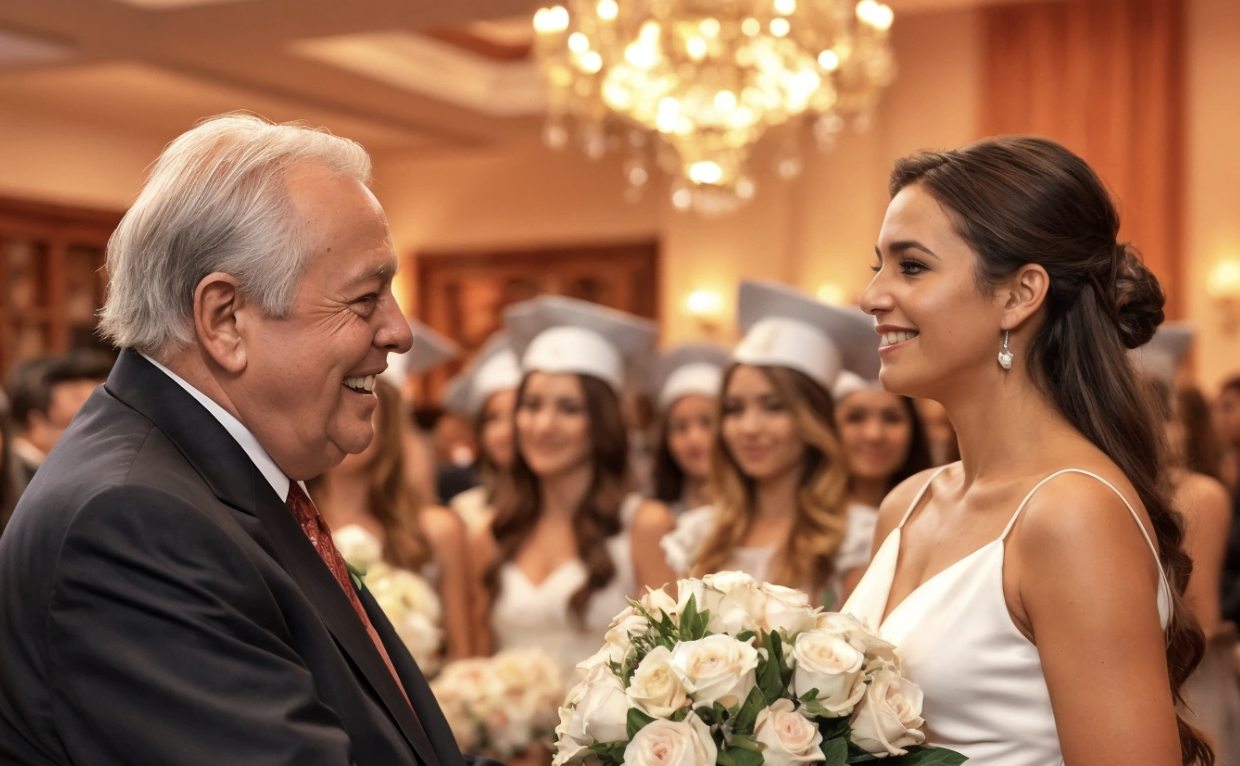Tatiana woke up at 6:45 — as always, to the alarm. Monday.
The kitchen smelled of oatmeal — grandma was already up. Life was going on as usual: ninth grade, lessons, homework, rare meetings with friends.
It seemed like everything was as it should be. But in reality, it was a little different.
Since childhood, Tatiana knew one thing, which had been repeated to her many times: her father was a hero, who died before she was born. That’s what her mother said. That’s what grandma said. And it was easy to believe. They told the story without unnecessary details, but with a special tenderness in their voices, as if it were a sacred secret that should not be touched. Her father was a “real man,” he “left too early,” and she — his “greatest legacy.”
This story became her shield. It was easier to live behind it. She could tell it to her classmates — without shame, even with a sense of pride. Some had fathers who beat them, some whose fathers disappeared entirely, but she — had a hero, who died for the country. In her mind, there were images, glimpsed from films: a man in uniform, a determined look, a farewell to his family before battle. Fantasy replaced reality.
After school, Tatiana often helped her grandmother — going to the store, carrying groceries. Grandma was aging, her legs often gave out. They had dinner together, at a small table. These evenings were filled with calm, but such a fragile calm that it seemed like one wrong move and everything would collapse.
And collapse, it did — suddenly.
Illness took her mother quickly. First, weakness, then pain, the ambulance, examinations. The diagnosis — cancer. A word that shatters the familiar world. Lena hid the truth as long as she could. But when it became impossible, Tatiana started taking care of her mother: holding her hand in the ward, learning to cook, running errands, calling doctors. All of this — at fourteen. Her childhood ended earlier than expected.
Her mother died quietly, almost imperceptibly — she just stopped breathing one night, when Tatiana had fallen asleep, her head resting on the edge of the bed.
After the funeral, she didn’t cry. Not immediately. It seemed like it wasn’t happening to her. That her mother had simply gone and would return any moment. In the evenings, Tatiana would catch herself waiting for familiar footsteps in the hallway. But the silence was never broken.
Her guardian became grandma. All the formalities were taken care of legally — documents, benefits, allowances. Svetlana Petrovna held herself together as best as she could. She cooked, washed, ironed, hugged. And every evening, she would repeat:
“Mom is now with us — watching from heaven. You are not alone, Tanya. We are together.”
But this “together” became increasingly fragile. The house became colder, even when the heaters were hot. Emptiness filled the rooms, even when they were both inside. Tatiana would sit by the window for hours, staring at the streetlight — the only constant light in her life. As if, in its beam, the answers were hidden.
One evening, when grandma was ironing and Tatiana pretended to be reading her textbook, a question escaped her chest, one that had been growing inside for a long time:
“Why did mom and dad… both die?”
Her voice trembled. It wasn’t a question — it was a cry of pain. The words she spoke aloud, for the first time, to see if they were real. Or perhaps this pain was just a dream?
Grandma flinched, put down the iron. There was a pause. Then a look — full of worry.
“Sometimes it happens. People leave too soon. But we are alive. We need to live on.”
“Both died.” These words became a new spell for Tatiana. She repeated them over and over, as if hoping to understand the meaning. But somewhere deep inside, a suspicion began to form — something didn’t sit right.
The morning began as usual. Tatiana arrived at school early, in the worn sweater her grandma had knitted. The air was sharp with autumn cold, her fingers frozen on the way.
But something felt strange in the building. People were staring. I mean, really staring. Some turned their eyes away, others whispered. The teachers avoided her gaze. Her friends acted strangely.
During break, Nastya, the school’s rumor queen, approached her. With a mixture of sympathy and curiosity, she said:
“Listen, Tanya… Please don’t be offended, okay?.. But do you know that your dad… didn’t die?”
Her heart stopped.
“What do you mean?”
“Well, my mom saw some homeless guy in the park. He called himself Pavel. He says he used to be with your mom. Like… your father.”
The words sank into emptiness. “Alive.” “Pavel.” “Homeless.”
At home that evening, Tatiana demanded the truth. Her voice was sharp, almost adult — like someone who had been deceived.
At first, grandma tried to distract her, avoid the conversation. But Tatiana didn’t back down.
And then Svetlana Petrovna sat on the sofa and told her everything. Slowly. Without embellishment.
Pavel was Lena’s youth friend. They grew up in the same village, loved each other. He went to the army, promised to return. Half a year later, a letter came — cold, soulless. He rejected Lena and the child. Asked her to forget him.
Lena couldn’t stay in her hometown. She moved to the city, hiding her pregnancy, starting a new life. There, Tatiana was born. Pavel never showed up again. Lena didn’t search — there was nothing to forgive.
Later, they heard that he had married, worked. Then — his life turned upside down. He hit rock bottom. For the last years, he lived on the streets. A stranger. Lost. Just a shadow.
“This is your father, Tanya,” grandma said quietly. “But he’s nobody to you. You grew up without him. You became yourself — not because of him, but in spite of him.”
The next day, Tatiana was walking home along the usual route when she saw a police car near the store. A man was standing next to it — hunched over, in worn clothes. His hair was matted, his face hidden by stubble, dirt, and time. But something in his appearance made her stop.
When the police led the man to the car, he suddenly turned around. Just for a second. But that second was enough. His gaze — blurry, but familiar — pierced through Tatiana.
It was him.
At home, grandma confirmed the terrifying truth: yes, it was Pavel. Yes, he was alive. And yes, now he was homeless.
Tatiana’s heart clenched with conflicting emotions: anger, pain, pity, shame. She wanted to scream. She wanted to erase everything from her memory. She wished he were really dead.
But he was alive. And he was her father.
On Monday, Tatiana came to school as usual — early, in her old sweater, with a backpack on her back. The previous blow had not yet passed, but she kept her face — cold, composed. However, the atmosphere in class had changed. The looks were different — full of judgment, almost hatred.
“The homeless girl has arrived,” someone whispered behind her, as she took her seat.
The nicknames poured in: “daughter of an alcoholic,” “heir to the trash,” “princess from the dumpster.”
The teachers also kept their distance. The homeroom teacher no longer smiled, the deputy headmaster pretended not to notice her. Absolute silence from those who once seemed to be reliable.
The worst part was that no one said a word in her defense. Not one of her friends, not one adult said: “It’s not your fault.” The world she had once felt safe in turned its back on her.
Before this, Tatiana had been one of the best students: responsible, curious, diligent. But suddenly, there were threes instead of fives, lower marks on essays, and answers in class were “unconvincing.”
At first, she chalked it up to coincidence, then to inattention. But the mistakes kept repeating. One evening, when she returned home, she quietly told grandma:
“I can’t take it anymore. I want to transfer to another school.”
Svetlana Petrovna, restrained but worried, went with her to the principal. The reception was polite but distant. The man in glasses, barely looking at them, said:
“We would help… but the load is heavy. And children like her, with emotional instability, create tension in the group. We already have a lot of problems.”
No apologies followed.
Tatiana left the school and didn’t go home. She sank onto a bench in the park, watching the leaves swirl at her feet. Children were playing ball, women were walking with strollers. And inside, everything hurt.
Why? Why did she have to pay for someone else’s mistakes? Why was her life falling apart just because she had such a father? She studied, helped, tried — why wasn’t that enough?
A thought, sharp as a blade, rose by itself:
“I am not my father. I am not guilty. Why should I suffer for this?”
But that thought changed nothing. The world had already decided: now she was “the daughter of the wrong one.”
“Adults can be stupid too,” grandma said that evening, when Tatiana cried on her shoulder. “There will always be good and evil. It’s not you who’s bad. It’s just that they are weak.”
Svetlana Petrovna spoke softly but firmly — like someone who knew the value of life. She patted her granddaughter on the head, as if she were little again.
“You’ll grow up, Tanya. You’ll forget all these people. Just don’t lose yourself. Do you hear? Don’t give yourself up to betrayal.”
These words became a lifeline. The only one to hold on to at that moment.
Winter began with a cough. Light, barely noticeable, growing into a deep one, with a wheeze. Grandma wasn’t worried at first: “She caught a cold,” “The weather’s like that.” But the cough got worse, added fever, shortness of breath.
The clinic, X-rays, diagnosis: bronchitis with complications on the heart. Prescribed treatment — drips, medications, rest. The pension went to medicine, there was little left for food.
Tatiana started keeping track of expenses. She kept a notebook, carefully writing down every penny. Sometimes she skipped breakfast to buy pills. She paid for utilities on the last day to avoid debts. School became secondary.
Her pale face, hollow cheeks, and oversized coat — none of it went unnoticed. But instead of sympathy, there were new mockeries.
“Saving on food?” one of the classmates sneered. “Or giving it to your dad?”
The girls snickered. Even those who had once been close friends.
The torn sleeve of her jacket became the subject of whispers. The ripped strap on her backpack — a reason for jokes and memes. And in the phones of her classmates, there was a photo of Tatiana eating a bun alone in the schoolyard, with the caption: “homeless girl.”
When the doorbell rang, and two women in strict coats with folders in their hands appeared at the doorstep, Tatiana immediately knew — it was from the guardianship.
“We need to talk. A signal has been received. We need to ask a few questions.”
The conversation was polite but formal. The women asked about living conditions, food, school. They inspected the apartment. Grandma tried to keep her dignity but couldn’t hide her cough. Their eyes met.
“There is an opportunity to offer temporary accommodation. At the center. A room, food, support. It would be easier for you.”
Tatiana stood up as if glued to the floor:
“No. I’m not going anywhere. I’m staying with grandma.”
“Think about it, it doesn’t take away your life, it’s help.”
“This is betrayal,” she said firmly and closed the door.
At night, tears flowed, not from fear, but from helplessness. From the realization that she couldn’t protect even those she loved most.
One of the women — younger, with brown eyes — lingered at the stairwell. She turned around and suddenly said:
“You’re a very strong and smart girl. Everything will get better. I believe in you.”
These were the first words from a stranger that touched her heart. These words became the anchor during those long nights when everything seemed hopeless. They reminded her: she was not broken. Not yet.
The school year was coming to an end. The class was rehearsing for graduation: some were preparing poems, others — songs, others — decorating the hall. The lists of participants were made, Tatiana’s name was nowhere to be found.
She sat in the corner of the class, listening to the voices, as if she didn’t exist. Worse than mockery was this — being invisible. As if she had been erased from the world.
Grandma couldn’t take it anymore. She called Nastya’s mother — Veronika.
“She’s a person too,” she said. “You may not like her, but she’s not to blame. Give her at least a chance.”
There was no response.
At one of the rehearsals, Tatiana was approached by the literature teacher, who was in charge of the event.
“We’ll have a song about dads. Very touching. Maybe you’d like to take a verse? Do you want to?”
Tatiana silently took the text. Read it. The lines: “Thank you, dad, for love and strength…” — they cut through with pain.
She carefully folded the paper and returned it.
“I won’t sing it.”
“Why?” the teacher was surprised.
“Because it’s not about me.”
And then something inside her broke. Everything that had been pressing for years collapsed.
“Because you’re just not like that!” Nastya shouted. “That’s why you didn’t fit in! Your mom died — and it’s good that such a child was left alone!”
The ringing silence. The world froze.
Tatiana jumped up:
“Don’t you dare say that about her! Don’t you dare! She was better than all of you put together! Better than you! She never betrayed, never lied, never humiliated. She lived — and loved! And you… you’re an empty shell! Nothing inside!”
Tears broke through the dam. She ran out of the class, slamming the door. She ran, not caring about the road. Just away — from these walls, from the faces, from the poison that had long filled her school days.
An explosion happened. But now — for the first time — she spoke. Loudly. Honestly. For herself. For her mom. For her voice, which no longer wanted to stay silent.
Tatiana came to the place where she had always felt safe — by the riverbank. This place had known her since childhood, hidden her under the willows, kept her silence. Here, she could be herself. Here, the world didn’t see her, but it didn’t hurt her either.
She sat on the grass, hugged her knees, and looked at the water. Her heart was empty, but not cold — more like burned out. It seemed like there was nothing left — neither pain, nor tears.
But suddenly, a cry rang out:
“Help!”
The voice was hoarse, almost weak, but full of despair. Tatiana jumped up. From behind the willow, there was a struggle in the water — someone was drowning.
Without thinking, she kicked off her sneakers, ran down, and jumped into the river.
The cold hit like an electric shock. Her breathing quickened. She swam, overcoming numbness and fear. The hand, the hair, the scream — all merged into one impulse: to save.
They pulled her ashore with difficulty. The ground was slippery, her legs gave way, but she didn’t let go. They were both alive — wet, trembling, but alive.
“How… are you…” Tatiana gasped.
“I don’t know… Thank you,” the girl whispered, coughing.
Her name was Maria. She was nineteen — a first-year architecture student. With a trembling voice, she explained that she had come here to meet a guy named Anton, with whom she had been dating for almost a year.
“I was going to end it…” she sniffed. “He changed. Became cruel. A stranger. Not the person he was before.”
Anton had suggested taking one last walk — along the river. But instead of parting ways, something terrible happened.
It turned out that he hadn’t just lost his feelings. He was part of a dangerous game. Through Maria, he had tried to get to her father — the governor of the region. His group had staged the girl’s disappearance to blackmail her father, forcing him to sign documents for a large construction project.
“He said: ‘Your daddy will sign if he thinks you’re dead,’” Maria said calmly now, but her eyes were still shocked.
They stood on the shore. At some point, Anton checked his phone and muttered:
“It’s done. Time’s up. Dead people don’t talk.”
And he shoved her into the water.
“I didn’t even have time to scream… But someone heard. It was you,” Maria looked at Tatiana, and in her eyes sparkled gratitude that couldn’t be put into words.
The next day, Tatiana brought Maria to her house. Gave her dry clothes, hot tea, and an old phone to contact her father.
The conversation was short, tense.
“Dad, it’s me. I’m alive. Don’t sign anything. It’s a trap. They wanted to use me…” Her voice trembled.
There was a long pause in the receiver, followed by a scream, then silence again. And finally — relief:
“I’m coming.”
Two hours later, a black jeep drove up to the house. A tall man in a strict coat got out. Upon seeing his daughter, he rushed to her, hugged her tightly, not hiding his tears.
“I almost went crazy…” he whispered.
Maria turned to Tatiana:
“She saved me. Without her, I wouldn’t have survived…”
The governor slowly approached Tatiana. She, confused, hid her hands in the sleeves of her sweater. He looked at her for a long time, as if he wanted to say something important, but only nodded. Then he left, holding his daughter tightly.
There were no interviews, no news headlines. But a new person entered Tatiana’s life — Maria. And that connection stayed.
The school was preparing for graduation. The last bell. Everyone was in dresses, with flowers, with ribbons. Tatiana stood at the entrance. In her hands — a simple white ribbon. It seemed no one was waiting for her. But she came.
When the famous song “about dads” played, she stayed aside. Didn’t raise her eyes. Just stood. But inside — there was no more pain. Only silence. Calm. Acceptance.
And then the hall noticed: Maria was entering. In a light dress, with neatly waved hair, in shoes that Tatiana herself wouldn’t have worn. On her wrist — a thin bracelet, on her face — a smile. All this — a gift from Tatiana.
“Let them see you as you are,” Maria had said the day before.
As the celebration was nearing its end, the doors opened. Sergey Nikolaevich, the governor of the region, walked in. The room froze. He confidently walked toward Tatiana. In his hands — a bouquet of red roses.
He handed her the flowers. Silently. Then leaned down and kissed her cheek.
“You’re not a stranger to me.”
The world froze. Teachers, students, parents — everyone watched. Some whispered: “Who is she to him?” Some filmed videos. Some couldn’t utter a word.
Tatiana turned to one of the girls, smiled, and quietly said:
“He said I’m not a stranger to him.”
And she left. Not running. With dignity.
Since then, Tatiana and Maria became inseparable friends. Now they often meet in the student cafeteria, discuss architecture and psychology, laugh, argue, dream — just live.



